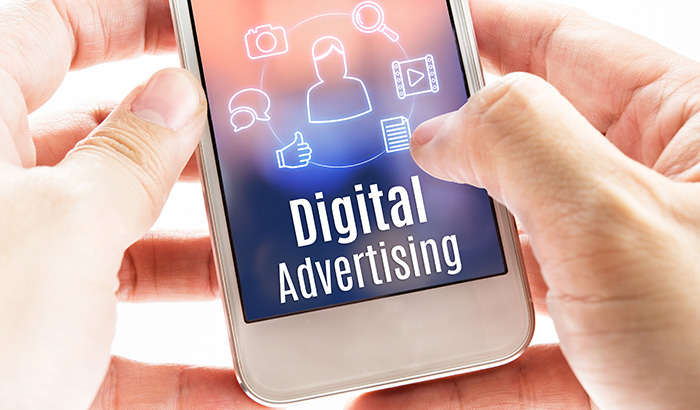In today’s digital age, businesses need innovative strategies to stand out and make a lasting impression. This is where digital advertising comes into play, offering many opportunities to enhance brand awareness and reach a vast audience.
Digital advertising has revolutionized how brands connect with their customers, enabling personalized messaging, targeted campaigns, and measurable results. By leveraging the power of digital advertising, businesses can generate buzz, increase brand recognition, and drive meaningful engagement.
In today’s blog, we’ll explore eight benefits of digital advertising that you don’t get with more traditional forms of advertising. Those benefits include increased targeting abilities, cost-effective advertising options, measurable results, brand awareness, personalized messaging, real-time optimization, etc. Keep reading to learn more!
8 Digital Advertising Benefits That Will Make the Difference for Your Business
1. Digital advertising comes with increased targeting abilities. Digital advertising offers increased targeting capabilities that allow businesses to reach their desired audience precisely and efficiently.
- Demographic Targeting: Digital advertising platforms enable businesses to target specific demographic groups such as age, gender, income, profession, etc. This allows advertisers to tailor their messages to the interests and needs of their target audience.
- Geolocation Targeting: Businesses can target users with digital advertising based on their geographic location. This means that ads can be shown to users in specific cities, regions, or even customized areas, ensuring that the ads reach the right audience in the right location.
- Interest Targeting: Digital advertising platforms offer advanced targeting options based on user interests and behavior. By analyzing online behavior, such as browsing history and interactions with websites or social media platforms, businesses can target users more likely to be interested in their products or services.
- Remarketing: Digital advertising allows businesses to reach users who have previously interacted with their brand or website. By utilizing remarketing techniques, businesses can show ads to users who have shown interest in their products or have abandoned a shopping cart, reminding them of their brand and encouraging conversion.
- Custom Audiences: Digital advertising platforms allow businesses to create custom audiences based on their customer data. By uploading customer email lists or using pixel data from their website, businesses can create specific segments and target their ads to those segments.
These targeting abilities provided by digital advertising result in more focused and relevant ad placements, allowing businesses to maximize their advertising budget and increase the chances of converting their desired audience into customers.
2. Digital advertising is cost-effective. Digital advertising is cost-effective in several ways.
- First, digital advertising is often less expensive than traditional advertising methods like television or print ads. For instance, with pay-per-click (PPC) advertising campaigns, businesses only pay for the clicks their ad receives. This allows them to control and monitor their advertising spend and prevent wasting money on unprofitable campaigns.
- Second, digital advertising platforms offer advanced targeting options that allow businesses to reach specific audience segments, such as demographics, interests, and geographic locations. This targeting ability leads to more relevant ad placements, which, in turn, can increase conversion rates and reduce ad spend.
- Third, digital advertising campaigns can be measured and tracked in real-time, allowing businesses to assess the effectiveness of their ad campaigns and make data-driven decisions. The resulting insights enable businesses to optimize future campaigns to reduce ad spend further and increase return on investment (ROI).
Digital advertising allows businesses to maximize their advertising budget by showing ads to a targeted audience, monitoring and controlling ad spend, and optimizing campaigns for better ROI.

3. Digital advertising has measurable results. Marketers can track and analyze the performance of their campaigns to understand their effectiveness.
- Data-driven platforms: Digital advertising relies on data-driven platforms such as social media, search engines, display networks, and email marketing. These platforms collect and analyze data on user behavior, interactions, and conversions, providing valuable insights into the effectiveness of ad campaigns.
- KPIs: Before launching a digital advertising campaign, marketers define specific Key Performance Indicators that align with their goals. Common KPIs include click-through rates (CTR), conversion rates, impressions, engagement metrics, return on ad spend (ROAS), and cost per acquisition (CPA).
- Tracking and analytics: Digital advertising platforms provide robust tracking and analytics tools that monitor various user actions. By implementing tracking pixels or codes on websites, advertisers can monitor user interactions such as clicks, conversions, purchases, form submissions, and more.
- Conversion tracking: One of the essential aspects of measuring digital advertising success is conversion tracking. This involves assigning unique tracking codes to specific actions or events (e.g., completing a purchase or signing up for a newsletter) so that marketers can measure how many users completed those actions after engaging with an ad.
- A/B testing: Digital advertising allows for A/B testing, where marketers can create different versions of ads or landing pages and test them against each other to determine which performs better. This iterative process helps optimize ad campaigns to achieve better results over time.
- Real-time reporting: Digital advertising platforms offer real-time reporting, which means advertisers can access data and insights on their campaigns’ performance immediately. This allows marketers to make data-driven decisions and adjust their strategies as needed.
- Audience targeting: Digital advertising allows precise audience targeting based on demographics, interests, behaviors, and other criteria. By reaching the right audience, marketers can improve the likelihood of achieving their desired outcomes, making measurement more meaningful.
- Attribution models: Attribution models help marketers understand the contribution of each touchpoint in the customer journey to the final conversion. This helps appropriately allocate credit to different marketing channels and optimize budget allocation for better results.
4. Digital advertising increases brand awareness. Digital advertising plays a crucial role in increasing brand awareness by reaching a wide audience and effectively promoting a brand’s message and value proposition online. Here are some ways in which digital advertising achieves this:
- Increased Audience Reach: Digital advertising allows brands to target specific demographics, interests, and behavior patterns, reaching a larger and more diverse audience than traditional advertising methods. By leveraging various digital platforms such as social media, search engines, and display networks, brands can extend their reach and connect with potential customers who may not have been exposed to their brand before.
- Enhanced Targeting Capabilities: Digital advertising provides advanced targeting options that allow brands to deliver their message to the right people at the right time. Through data analysis and audience segmentation, brands can target their advertisements to specific demographics, interests, geographic locations, and even browsing behaviors. This level of precision ensures that the brand’s message is delivered to the most relevant audience, increasing the likelihood of brand recall and recognition.
- Interactive and Engaging Ad Formats: Digital advertising offers a range of interactive and engaging ad formats that capture users’ attention and encourage them to interact with the brand. These formats include videos, interactive banners, and immersive experiences that can create a lasting impression and increase brand awareness.
- Measurable Results and Data Insights: One of the significant advantages of digital advertising is its ability to provide measurable results and data insights. Brands can track real-time ad performance, including impressions, clicks, engagement rates, and conversions. This data allows brands to analyze the effectiveness of their campaigns, make data-driven optimizations, and gain insights into their target audience’s preferences and behaviors.
By leveraging the reach, targeting capabilities, interactive ad formats, and actionable data insights of digital advertising, brands can significantly increase their brand awareness and ensure that their message reaches the right audience in the most effective way possible.
5. Digital advertising allows for personalized messaging. Digital advertising enables personalized messaging, which is one of its key advantages over traditional advertising methods.
Personalization refers to tailoring marketing messages and content to individual users based on their interests, preferences, demographics, behaviors, and past interactions. There are several ways digital advertising achieves personalized messaging:
- Data collection and analysis: Digital advertising platforms collect vast amounts of data about users’ online activities, including browsing behavior, search history, social media interactions, and more. Marketers can use this data to gain insights into individual user preferences and interests.
- Audience segmentation: With the help of data analytics, marketers can segment their target audience into smaller groups based on common characteristics. This segmentation allows for more personalized content and messaging that resonates with specific user segments.
- Dynamic ad content: Digital ads can be dynamically generated and customized in real-time based on user data. For example, an e-commerce website can show personalized product recommendations to users based on their previous purchases or browsing history.
- Behavioral retargeting: Digital advertising allows marketers to retarget users who have previously engaged with their website or ad. Advertisers can re-engage potential customers and guide them further along the sales funnel by showing relevant ads to users who have already shown interest.
- Location-based targeting: Mobile devices and digital platforms often allow advertisers to target users based on their geographic location. This localization enables businesses to deliver ads that are specific to a user’s city or region, making them more relevant and engaging.
- Personalized email marketing: Email marketing is a popular digital advertising method that allows for highly personalized messaging. By segmenting email lists and delivering tailored content, businesses can create more meaningful and targeted interactions with their audience.
- Personalized landing pages: Digital advertising can drive users to personalized landing pages that cater to specific user segments or individuals. These landing pages can deliver content, offers, or products that align with the user’s interests and needs.
- Customer data platforms (CDPs): CDPs are tools that consolidate customer data from various sources, allowing marketers to build comprehensive user profiles and deliver more personalized experiences across different channels.

Personalized messaging in digital advertising is essential because it enhances user experience, improves engagement rates, and increases the likelihood of conversions.
By showing users ads that are relevant to their interests and needs, advertisers can establish stronger connections with their audience and create more impactful marketing campaigns.
However, it is crucial to handle user data responsibly, respecting privacy and providing transparent opt-in mechanisms for data collection and personalization.
6. Digital marketing provides flexibility and allows for real-time optimization. One of the key advantages of digital marketing is the flexibility it offers, including real-time optimization. This flexibility empowers businesses to make data-driven decisions and adapt their marketing strategies on the fly. Here’s why flexibility and real-time optimization are essential components of digital marketing:
- Adapting to Consumer Behavior: Digital marketing allows businesses to analyze and understand consumer behavior in real time. By monitoring engagement metrics, such as click-through rates, conversion rates, and bounce rates, marketers can gain insights into how their target audience is responding to their campaigns. This data can guide them in making immediate changes to optimize their marketing efforts, ensuring that they are aligned with consumer preferences.
- Dynamic Campaign Management: With digital marketing, campaigns can be dynamically managed and adjusted in real time. Marketers can optimize various campaign aspects based on real-time performance data, including ad copy, visuals, targeting criteria, and budget allocations.
This level of flexibility allows businesses to capitalize on successful approaches and pivot away from underperforming strategies swiftly. - Maximizing Return on Investment: The ability to optimize campaigns in real-time helps businesses maximize their return on investment (ROI). By closely monitoring key metrics, marketers can identify areas of improvement and allocate resources more effectively. Furthermore, real-time optimization allows immediate cost adjustments, ensuring ad spend is focused on the most promising avenues.
- Keeping Up with the Competitive Landscape: In the dynamic digital landscape, being able to adapt quickly to market changes is crucial. Flexibility and real-time optimization give businesses a competitive edge, allowing them to stay ahead of the curve. Whether it’s adjusting to trends, responding to competitor campaigns, or capitalizing on new opportunities, digital marketing enables agile decision-making and the ability to pivot strategies as needed.
By harnessing the flexibility and real-time optimization capabilities of digital marketing, businesses can fine-tune their campaigns, increase their marketing efficiency, and stay in sync with ever-changing consumer behavior and market dynamics.
7. Digital advertising helps you keep up with the competitive landscape. Firstly, with the rise of e-commerce and online advertising, digital advertising has become crucial to any business’s marketing strategy.
With more and more businesses leveraging digital advertising to reach their target audiences, businesses that shy away from digital advertising risk being left behind. Digital advertising can help businesses stay competitive by staying updated with the latest online marketing trends, platforms, and strategies.
Secondly, digital advertising allows businesses to monitor their competition closely and adjust their strategies accordingly.
By analyzing their competitors’ campaigns, businesses can gain insights into what works and what doesn’t, what resonates with their shared audience, and how they can better differentiate themselves from the competition.
Businesses can then use this knowledge to fine-tune their campaigns and adapt their strategies to compete more effectively.
Thirdly, digital advertising provides businesses with flexible, dynamic, and highly targeted advertising strategies that can quickly adapt to the ever-changing landscape.
By leveraging digital advertising, businesses can optimize various campaign aspects based on accurate and real-time data, including ad copy, visuals, targeting criteria, and budget allocations.
This flexibility allows businesses to pivot their strategies swiftly and capitalize on successful approaches while distancing themselves from underperforming ones.

8. Digital advertising brings increased mobile reach. Mobile devices have become the primary means of accessing the internet, with mobile internet usage surpassing desktop usage in recent years. Digital advertising allows businesses to capitalize on this trend by increasing mobile reach and targeting users on their devices. Here are some of the ways digital advertising can improve mobile reach:
- Mobile-Friendly Ad Formats: Digital advertising offers mobile-friendly ad formats, such as mobile search ads or mobile display ads that are optimized for mobile devices. These ad formats are designed to fit seamlessly into the user’s mobile browsing experience, ensuring that the ad is not intrusive and offers value to the user.
- Mobile-Specific Targeting: Digital advertising allows for specific targeting options based on mobile-specific data, such as location data, device type, and network carrier. Advertisers can use this information to deliver targeted ads to users on their devices and improve their mobile reach.
- Cross-Device Targeting: Digital advertising can use device graphing and cross-device tracking techniques to reach users on both their mobile and desktop devices. This feature allows advertisers to maintain a consistent message across all user devices and maximize their reach.
- Mobile App Advertising: Digital advertising also offers an opportunity for businesses to advertise within mobile apps. Mobile app ads are a popular way to reach users on their mobile devices and offer a wide range of targeting options based on user behavior within the app.
Digital advertising’s ability to deliver mobile-friendly ad formats, mobile-specific targeting options, cross-device targeting, and mobile app ads makes it an effective tool for increasing mobile reach and targeting users on their preferred devices.
As you can see, digital marketing tools can take your marketing game to the next level in ways that traditional marketing can’t. The best way to leverage the advantages of digital marketing is by working with a digital marketing agency that’s an established expert in the marketing field.
This will allow you to fully maximize your digital marketing results without learning about every marketing area. You can focus on your business while the experts focus on getting you the digital advertising results you need to succeed!
Start Digital Advertising With Revity Marketing
Ready to elevate your digital advertising game and unlock the full potential of your business? Look no further than Revity, your trusted digital marketing agency. Harness the power of our expertise, cutting-edge digital marketing tools, and proven strategies to take your brand to new heights.
With Revity Marketing by your side, you’ll gain access to a comprehensive suite of digital marketing tools specially designed to optimize your campaigns, maximize your ROI, and drive tangible results. Their team of skilled professionals will work closely with you to develop a tailored digital advertising strategy that aligns with your goals and resonates with your target audience.
Don’t settle for ordinary results in the digital landscape. Partner with Revity Marketing and unleash the true potential of your business through our extensive knowledge, unwavering dedication, and unparalleled expertise in digital advertising.
Take the first step towards unlocking remarkable growth and success by contacting Revity Marketing today. Call us at 801.935.8687, or schedule an appointment with us to get started today.





